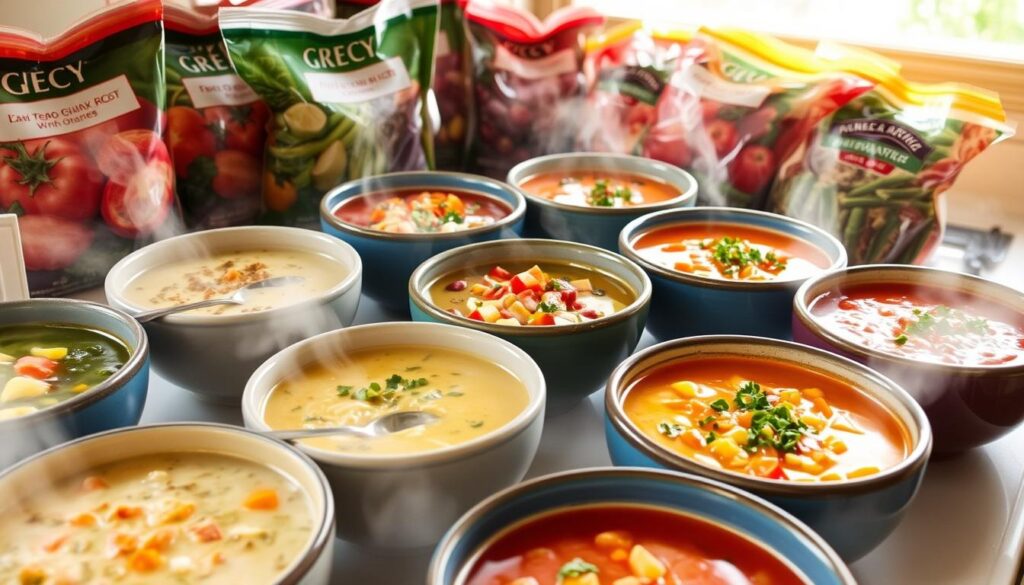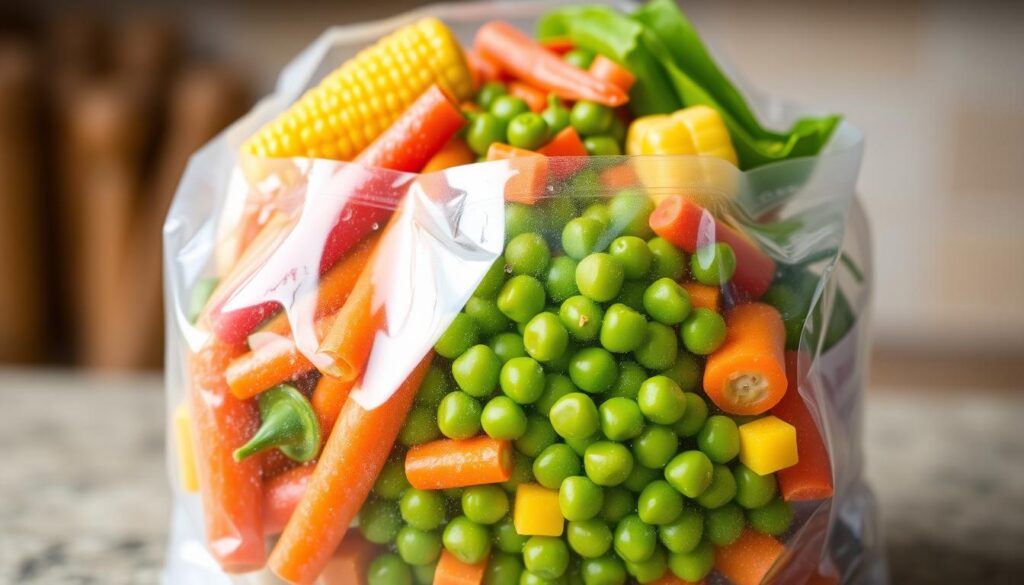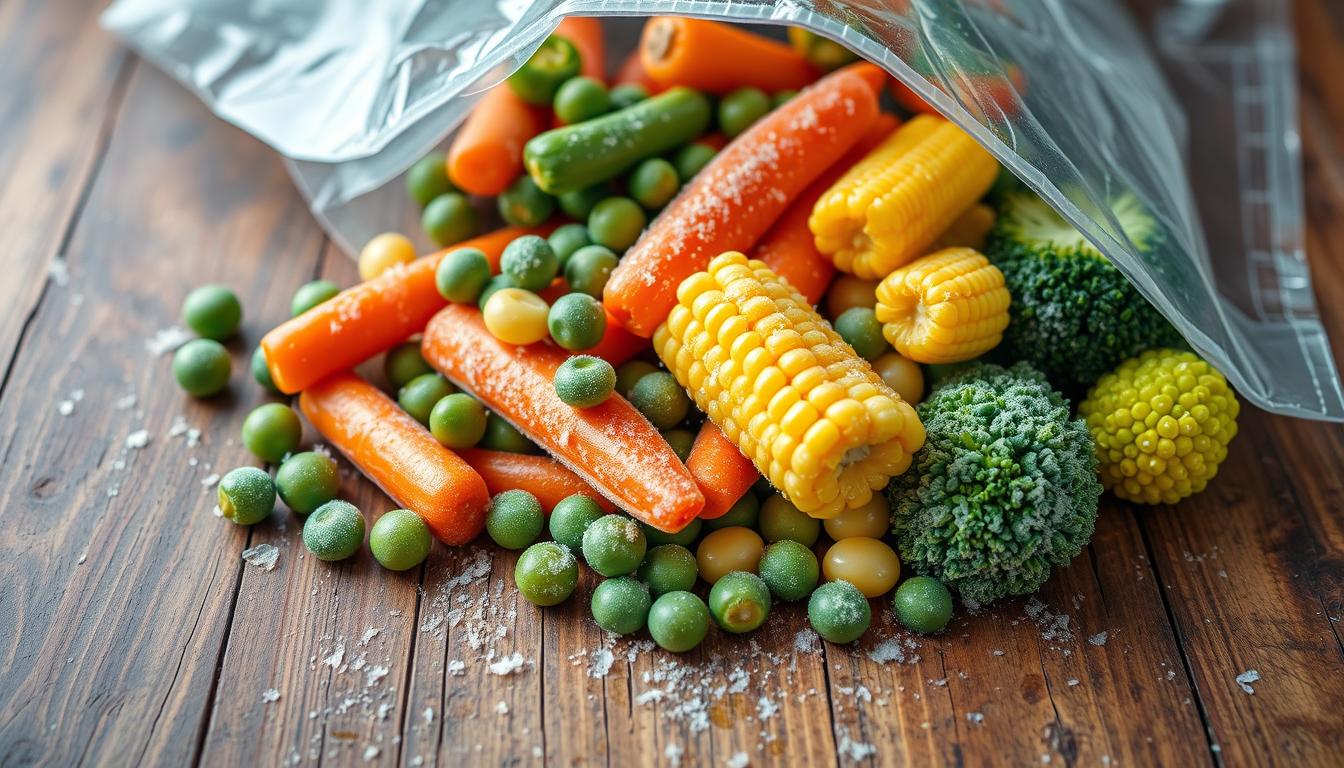As the days get shorter and colder, a warm bowl of soup is perfect. But, who has time to chop and simmer for hours? Frozen veggies are a quick fix, making tasty, veggie-rich soups in no time.
This article shows how to make quick soups with frozen veggies. You’ll learn their benefits, the key ingredients for a comforting soup, and how to make these meals. These ideas are great for busy people, health lovers, or anyone wanting a tasty, healthy meal.
Table of Contents
Introduction to Frozen Veggie Soups
Frozen vegetables are a game-changer for quick and nourishing soups. They offer a convenient and cost-effective way to make delicious meals. Whether you’re busy on weeknights or meal prepping, frozen vegetable soups are a lifesaver.
Benefits of Using Frozen Vegetables for Quick Soups
Frozen vegetables are as nutritious as fresh ones but often cheaper and available all year. They’re perfect for budget-friendly meals and convenience cooking. Plus, they save time since they’re pre-chopped and pre-cooked.
- Frozen veggies are packed when they’re in season, ensuring great taste and texture.
- They don’t take long to defrost or soften, so add them towards the soup’s end to avoid a soggy texture.
- Store-bought frozen vegetables are pre-cooked, saving you time.
Frozen vegetable soups make it easy to create a healthy, budget-friendly meal. You can choose from classic vegetable medleys or unique blends. The options for frozen veggie soups are endless.

Essential Ingredients for Frozen Veggie Soups
To make tasty soups with frozen veggies, start with a good pantry. You’ll need frozen vegetable varieties, quality vegetable stock or broth bases, and soup seasonings. These pantry staples help you make a comforting soup quickly.
Versatile Frozen Vegetable Blends
Choose frozen vegetable blends with your favorite veggies like carrots, broccoli, and spinach. These mixes are easy to use and add nutrition to your soup. You can also pick individual frozen veggies for a custom blend.
Flavorful Broth Options
Use a tasty vegetable stock or chicken broth to start your soup. For more flavor, try a broth base mixed with water. Add canned diced tomatoes, tomato juice, and herbs like onions and garlic for extra taste.
| Ingredient | Quantity | Purpose |
|---|---|---|
| Frozen Vegetable Blend | 2 cups | Provides a variety of nutritious vegetables |
| Vegetable Stock | 4 cups | Offers a flavorful base for the soup |
| Diced Tomatoes | 1 can (14.5 oz) | Adds texture and enhances the flavor |
| Garlic | 2 cloves, minced | Provides aromatic depth |
| Dried Herbs (e.g., basil, oregano, thyme) | 1 tsp each | Enhances the overall flavor profile |

With these ingredients, you’re ready to make delicious soups with frozen veggies. They’re great for quick weeknight meals or cozy weekends.
Simple Steps to Make Delicious Frozen Veggie Soup
Making soups with frozen veggies is an easy and nutritious way to enjoy a healthy meal. Start by sautéing onions and garlic in a pot with 3 tablespoons of olive oil. Once fragrant, add any fresh vegetables you have on hand and cook them briefly for added flavor.
Next, add 6 cups of chopped frozen vegetables, a perfect addition to these soups, and cook for a minute or two. Pour in 4-5 cups of chicken or vegetable broth, along with a 15-ounce can of diced tomatoes. Let everything simmer until the veggies are tender, about 15-20 minutes.
- Finish the soup by adding fresh herbs, a squeeze of lemon juice, and any preferred seasonings.
- For a creamy version, stir in 1 cup of heavy cream or blend in 3/4 cup of soaked cashews or a 12-ounce box of extra soft silken tofu.
- Adjust the seasoning, and your delicious soups with frozen veggies is ready to serve.
The entire process takes only 30-35 minutes, making it a quick and easy one-pot meal. Serve it hot, garnished with extra herbs or Parmesan cheese for a tasty, comforting dish.
For kids, you can puree the soup or keep it chunky, depending on their preference. The beauty of this recipe lies in the combination of fresh and frozen veggies, creating a flavorful, easy soup that the whole family will love.
“Cost is often the biggest barrier to eating more vegetables, so using frozen veggies in soups is a smart and budget-friendly way to boost nutrition.”
soup with frozen veggies: Nutritious and Comforting
Soups with frozen veggies are both easy and packed with nutrients. They keep their vitamins, minerals, and fiber, giving you a big nutritional boost. These nutrient-dense soup dishes are also low in calories and fat. They’re great for a quick, healthy meal any day of the week.
Enjoying these plant-based recipes alone or with a salad or bread is a treat. They’re perfect for a family-friendly meal. The mix of soft veggies, tasty broth, and optional grains or proteins is incredibly comforting.
| Yield | Prep Time | Total Time | Calories per Serving |
|---|---|---|---|
| 6 servings | 20 minutes | 1 hour 20 minutes | 216 |
Creating a tasty frozen veggie soup is all about the right ingredients. Start with extra-virgin olive oil, unsalted butter, and herbs like dried basil and thyme. Then, sauté a yellow onion and garlic for flavor.
Add broth, grape tomatoes, and various sliced veggies like carrots, celery, potatoes, and fennel. This mix creates a colorful, nutritious soup.
This nutrient-dense soup is super versatile. You can add your favorite frozen veggies, fresh herbs, and Parmesan cheese. It’s a great way to make a meal that’s both cozy and personalized. So, for a quick, family-friendly meal or a comforting dish, frozen veggie soup is the answer.
Customizing Your Frozen Veggie Soup
Creating your own soups with frozen veggies is easy and fun. You can mix and match different frozen veggies, use various broths, and add fresh herbs and spices. This lets you make the soup just how you like it.
Adding Fresh Herbs and Spices
Adding Italian seasoning, Creole seasoning, red pepper flakes, or a squeeze of lemon juice can make your soup taste amazing. Fresh herbs like parsley, cilantro, or dill can also add color and freshness.
Frozen veggies are just as good as fresh ones. Freezing helps keep their nutrients and flavor. This makes them a great choice for quick, healthy meals.
- Frozen veggies don’t need as much time to defrost or soften compared to assumptions; they should be added towards the end of the cooking process to avoid sponginess.
- Store-bought frozen vegetables are typically pre-cooked, either steamed or blanched before packaging, so they’re ready to go.
- Choosing the right frozen vegetable package is crucial for maintaining texture in dishes like vegetable soup; avoid clumping in the package.
Using frozen veggies in your soup lets you personalize your soup recipes, try new flavor variations, and add your favorite herb and spice additions. So, don’t be shy to make your frozen veggie soup unique!
Serving Suggestions for Frozen Veggie Soups
Frozen veggie soups are great on their own but even better with some extras. Try them with crusty bread, flaky dinner rolls, or savory crackers for dipping. For a fuller meal, add a fresh salad or a side of quinoa, rice, or couscous.
Want a heartier dish? Add cooked pasta, chickpeas, or shredded chicken to your soup. These soup accompaniments make your meal more satisfying and nutritious.
Looking for versatile serving options? Serve your soup with roasted vegetables, garlic toast, or steamed greens. There are countless ways to pair your soup with other dishes.
“The frozen veggie soup is a quick and easy weeknight staple, but by adding a few simple extras, you can turn it into a truly memorable meal.”
Frozen veggie soups are perfect for any meal, big or small. Get creative with your soup accompaniments and side dish ideas to enhance this versatile dish.
Storing and Reheating Leftover Frozen Veggie Soup
Enjoying frozen veggie soups doesn’t have to stop after you eat. You can keep enjoying them for weeks or even months. Here’s how to store and reheat your soup the right way.
Freezing Tips for Meal Prep
Leftover frozen veggie soup stays fresh in the fridge for 4-5 days. For longer storage, freeze it in airtight containers or bags. This keeps it fresh and easy to grab for a quick meal.
Freezing within 3 months is best to keep the taste and texture good. Freezing for too long can make the soup taste watery and change its texture. These tips help you use frozen soup in your meal prep and enjoy it on busy nights.
Reheating Methods
There are a few ways to reheat your soup. Thawing it in the fridge overnight and then heating it on the stovetop is the gentlest method. This keeps the soup’s texture and taste intact. If you’re in a hurry, defrost it in the microwave and then heat it gently in a saucepan.
Always add broth or water if the soup is too thick. This makes it creamy again. Taste it as you reheat and adjust the seasoning to keep it delicious.
Learning to store and reheat your frozen veggie soups makes them convenient and tasty. With a bit of prep, your leftover soup can be a quick and tasty meal any time you want.
Dietary Considerations for Frozen Veggie Soups
Frozen veggie soups are great for many diets. They are naturally vegetarian and can be vegan by using plant-based broth. They also work well for low-calorie or low-carb diets because they are full of nutrients.
These soups can also be gluten-free by skipping wheat-based thickeners or croutons. With a few changes, they fit many diets, from dietary-friendly recipes to low-calorie meals and gluten-free adaptations.
| Dietary Consideration | Recommended Frozen Veggie Options |
|---|---|
| Vegetarian/Vegan | Butternut squash, sweet potatoes, cauliflower, broccoli, spinach, kale |
| Low-Calorie | Zucchini, green beans, broccoli, Brussels sprouts, cauliflower |
| Gluten-Free | Frozen vegetables without any added wheat-based ingredients |
Using these dietary-friendly frozen veggies, you can make tasty and healthy soups. They meet many dietary needs and preferences.
Creative Twists on Traditional Frozen Veggie Soups
Classic vegetable soup is always comforting. But, you can add a unique twist to frozen veggie soups. Draw inspiration from global soup recipes and ethnic flavor profiles to make a simple dish exciting and versatile.
International Flavor Inspirations
Try recipe variations by adding spices, herbs, and ingredients from around the world. For instance, add jalapenos, cumin, and cilantro for a Mexican-inspired soup. Or, use ginger, soy sauce, and bok choy for an Asian-style version. Different broth bases, like coconut milk or tomato-based sauces, can also create tasty and unexpected flavor profiles.
In fusion cuisine, the options are endless. Turn your favorite frozen veggie blend into a Thai-inspired coconut curry soup, a Mediterranean-style tomato and white bean soup, or a Indian-spiced lentil and spinach soup. The most important thing is to let your creativity shine and have fun with the flavors.
“Embracing global influences can transform a simple frozen veggie soup into an exciting and versatile dish.”
By exploring international flavor inspirations, you can make your frozen veggie soups extraordinary. This will give your family or customers a unique and satisfying dining experience.
Time-Saving Tips for Quick Frozen Veggie Soups
Frozen veggie soups are a great, easy meal choice. With a few quick tips, you can make them even faster. These strategies will help you enjoy a healthy soup with little effort.
Chopping fresh veggies ahead of time and storing them in the fridge is a big time-saver. This way, your soup prep is done before you start. Also, sauté more onions and garlic than you need. Use the extra in another dish later to save time.
Using an immersion blender can puree your soup right in the pot. This skips the need for a blender and makes cleanup easier. It’s a smart way to save time and effort.
These time-saving techniques make a quick frozen veggie soup easy to make. With a bit of prep and smart strategies, you’ll have a streamlined cooking process. This way, you can serve a nourishing and comforting meal with minimal effort.
“With these simple tips, you can have a hot, homemade soup on the table in a fraction of the time it would normally take.”
Conclusion
Soups with frozen veggies are a fantastic choice for quick, easy meals. Not only are they nutritious, but they also won’t break the bank. You can easily make delicious soups with frozen veggies by combining them with flavorful broths and your favorite seasonings.
These soups with frozen veggies are simple to prepare and can be customized to fit a variety of diets. They’re perfect for busy weeknights or when you’re meal prepping, making them a convenient option for any occasion. Everyone in your family will enjoy these hearty and healthy meals.
This guide should have inspired you to try making soups with frozen veggies at home. Now that you know how to create a variety of tasty soups, you’ll find that they’re quick, easy, and a great way to make your meals more satisfying.
So, why not start making soups with frozen veggies today? These meals offer endless possibilities for delicious combinations. They’re good for your health and taste amazing. Get creative and enjoy the wholesome goodness of soups with frozen veggies!
